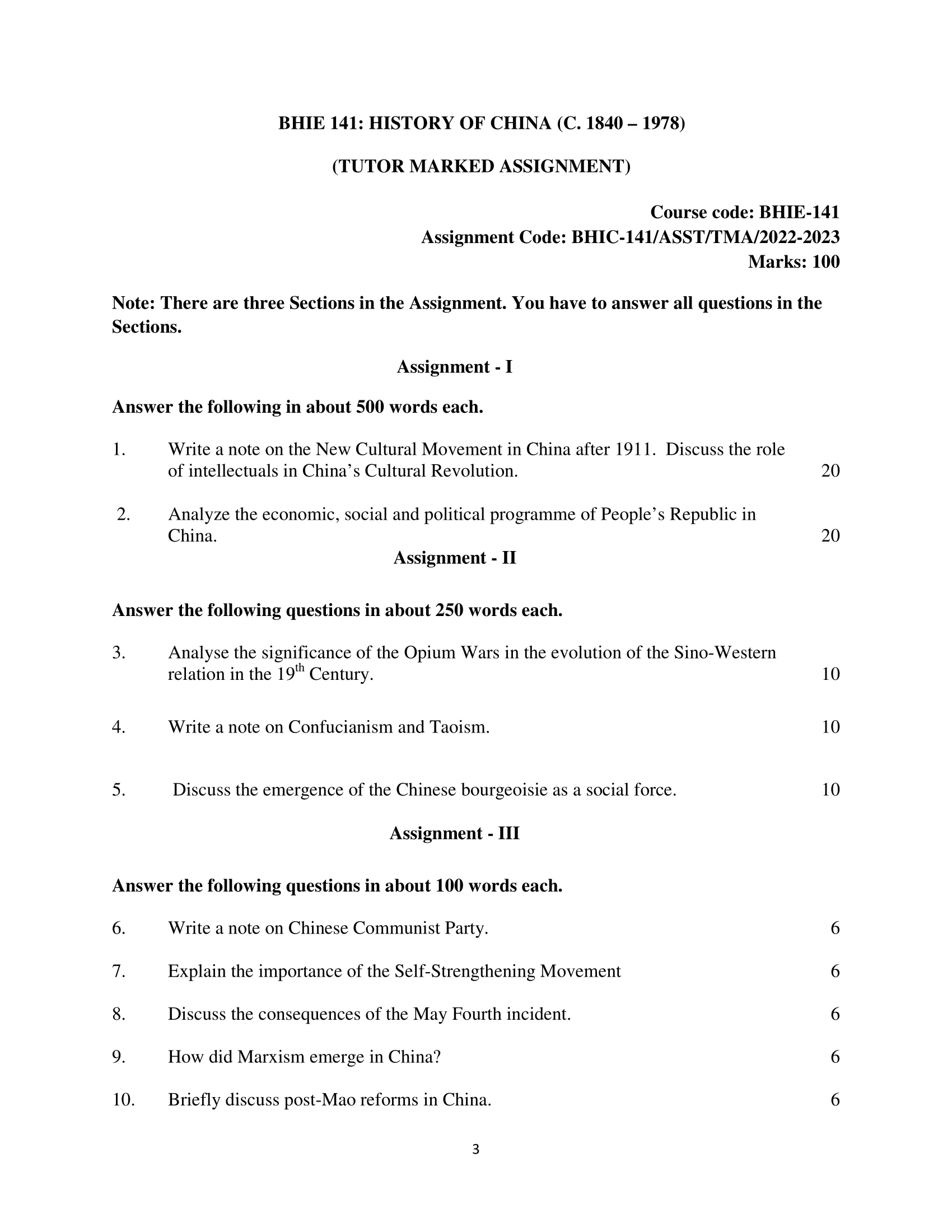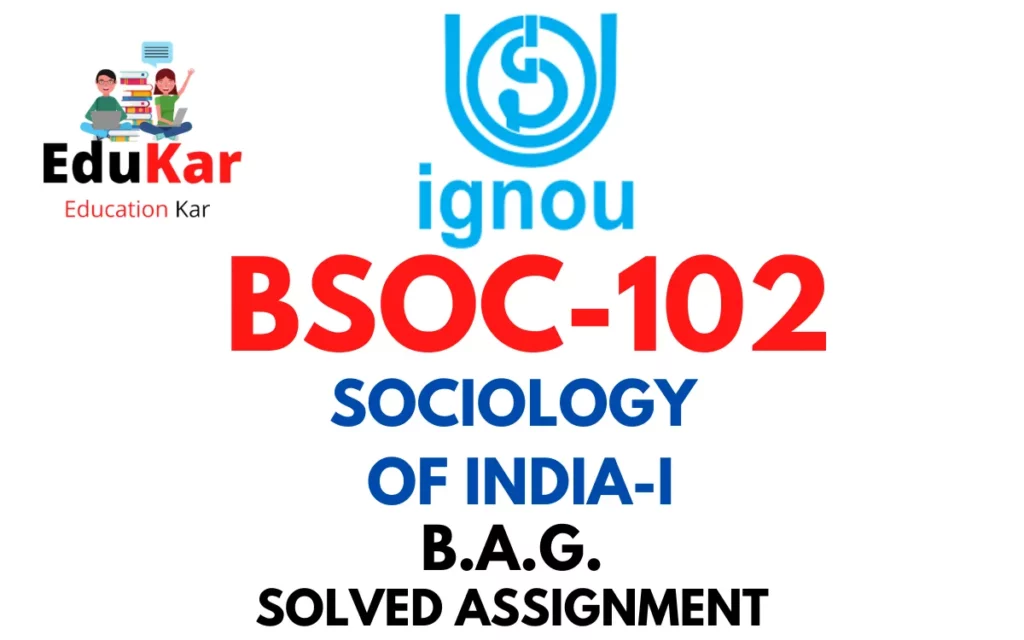Contents
- 1 Assignment – I
- 2 Answer the following in about 500 words each.
- 3 1. Write a note on the New Cultural Movement in China after 1911. Discuss the role of intellectuals in China’s Cultural Revolution.
- 4 2. Analyze the economic, social and political programme of People’s Republic in China.
- 5 Assignment – II
- 6 Answer the following questions in about 250 words each.
- 7 3. Analyse the significance of the Opium Wars in the evolution of the Sino-Western relation in the 19th Century.
- 8 4. Write a note on Confucianism and Taoism.
- 9 5. Discuss the emergence of the Chinese bourgeoisie as a social force.
- 10 Assignment – III
- 11 Answer the following questions in about 100 words each.
- 12 6. Write a note on Chinese Communist Party.
- 13 7. Explain the importance of the Self-Strengthening Movement.
- 14 8. Discuss the consequences of the May Fourth incident.
- 15 9. How did Marxism emerge in China?
- 16 10. Briefly discuss post-Mao reforms in China.

| Title | BHIE-141: IGNOU BAG Solved Assignment 2022-2023 |
| University | IGNOU |
| Degree | Bachelor Degree Programme |
| Course Code | BHIE-141 |
| Course Name | HISTORY OF CHINA |
| Programme Name | Bachelor of Arts (General) |
| Programme Code | BAG |
| Total Marks | 100 |
| Year | 2022-2023 |
| Language | English |
| Assignment Code | BHIC-141/ASST/TMA/2022-2023 |
| Last Date for Submission of Assignment: | For June Examination: 31st April For December Examination: 30th September |

Assignment – I
Answer the following in about 500 words each.
1. Write a note on the New Cultural Movement in China after 1911. Discuss the role of intellectuals in China’s Cultural Revolution.
Ans: The New Cultural Movement was a significant event in Chinese history that took place after the fall of the Qing Dynasty in 1911. The movement was characterized by a radical rethinking of traditional Chinese values and an embrace of new ideas, including democracy, individualism, and nationalism. This was a time of intellectual ferment and creative expression, as artists, writers, and intellectuals sought to create a new, modern Chinese culture that would help the country keep pace with the rest of the world.
The role of intellectuals in the New Cultural Movement was central, as they were the ones who led the charge in the quest for cultural renewal. They used literature, art, and other forms of creative expression to challenge traditional ideas and promote new, progressive values. They also played a key role in the political arena, advocating for greater democracy and individual rights. This was a time of great hope and optimism, as many believed that China was on the cusp of a new era of progress and prosperity.
However, the New Cultural Movement was also a time of great upheaval and conflict, as the old order resisted change and sought to maintain the status quo. This led to a series of clashes between the old and new forces, as the government sought to suppress dissent and preserve its power. Despite these challenges, the New Cultural Movement was a critical turning point in Chinese history, as it paved the way for a new era of intellectual and cultural creativity that continues to shape the country today.
The New Cultural Movement had a profound impact on the development of the Chinese Communist Party (CCP), as many of its leaders and supporters were intellectuals who had been involved in the movement. The CCP was founded in 1921 and became the dominant political force in China after the communist victory in the Chinese Civil War in 1949. One of the key objectives of the CCP was to continue the work of the New Cultural Movement and promote a new, progressive Chinese culture that would help the country keep pace with the rest of the world.
The Cultural Revolution, which took place in the mid-1960s, was a major event in Chinese history that had a profound impact on the country’s culture and politics. The revolution was led by Mao Zedong, the Chairman of the CCP, and was aimed at purging the country of “counter-revolutionary” elements and promoting a new, revolutionary culture. This was a time of great upheaval and conflict, as the government sought to suppress dissent and preserve its power. The role of intellectuals in the Cultural Revolution was central, as they were seen as the primary agents of change and the key to the success of the revolution.
However, the Cultural Revolution also had a devastating impact on China’s culture and society, as the government sought to eliminate all forms of dissent and impose its will on the population. This led to widespread violence, repression, and censorship, as the government sought to suppress all forms of artistic and intellectual expression that challenged its authority. Despite these challenges, the Cultural Revolution was a critical turning point in Chinese history, as it paved the way for a new era of cultural creativity and intellectual freedom that continues to shape the country today.
Ans: The People’s Republic of China (PRC) was founded in 1949, following a civil war that lasted several years. Since then, the PRC has undergone tremendous economic, social, and political changes, aimed at transforming the country from a traditional agrarian society into a modern, industrial power.
Economic Program: China’s economic program has been based on a combination of central planning and market forces. In the early years of the PRC, the government controlled all aspects of the economy, including production, pricing, and distribution. In the late 1970s, however, the Chinese government began to introduce market-oriented reforms, which have since led to a period of rapid economic growth and increased prosperity for the country’s 1.4 billion people. Today, China is one of the largest economies in the world and is considered a crucial player in the global economy.
Social Program: The PRC’s social program has been aimed at improving the standard of living for its citizens, providing them with access to healthcare, education, and other essential services. The government has invested heavily in social infrastructure, including hospitals, schools, and affordable housing. At the same time, it has implemented a number of measures to reduce poverty and increase social equality, including programs aimed at helping the rural poor and ethnic minorities.
Political Program: The political program of the PRC is based on the principles of socialism and the rule of the Communist Party. The party exercises absolute control over all aspects of political life in the country, including the media, the military, and the judiciary. The government also maintains a strict censorship regime to prevent dissent and maintain social stability. Despite these measures, however, the PRC has undergone a period of political liberalization in recent years, with increasing freedom of speech and greater tolerance for dissent.
Assignment – II
Answer the following questions in about 250 words each.
3. Analyse the significance of the Opium Wars in the evolution of the Sino-Western relation in the 19th Century.
Ans: The Opium Wars, which took place in the mid-19th century, marked a pivotal moment in the evolution of Sino-Western relations. Prior to this period, China was considered the dominant power in East Asia, while the West was seen as inferior. The wars challenged this traditional hierarchy and demonstrated the growing power and influence of Western nations in the region.
The first Opium War (1839-1842) was fought between China and Britain over the illegal opium trade. The British had been importing opium into China, which caused widespread addiction and social problems. When the Chinese government attempted to ban the trade, the British responded with force, ultimately defeating the Chinese and forcing them to sign the Treaty of Nanking. This treaty provided the British with a number of concessions, including the right to trade freely in China and the establishment of several treaty ports where they were exempt from Chinese law.
The second Opium War (1856-1860) was fought between China and a coalition of Western powers, including Britain, France, and the United States. This conflict resulted in the further weakening of the Chinese imperial government and the imposition of even more unfavorable terms on China, including the legalization of the opium trade and the granting of extraterritorial rights to Westerners.
The Opium Wars had far-reaching consequences for Sino-Western relations and for China itself. The wars marked the beginning of China’s “Century of Humiliation,” during which it was subjected to various forms of foreign exploitation and control. They also demonstrated the growing power of the West and their willingness to use force to achieve their objectives. As a result, China was forced to adopt a more accommodating stance towards the West, which paved the way for further Western intrusion into Chinese affairs and ultimately led to the complete subjugation of the country.
4. Write a note on Confucianism and Taoism.
Ans: Confucianism and Taoism are two of the most influential philosophical and religious traditions in East Asia. Both originated in ancient China and have had a profound impact on the development of Chinese culture, society, and politics.
Confucianism, founded by the philosopher Confucius, is a complex system of ethics, morality, and social order that emphasizes the importance of education, self-cultivation, and respect for authority. Confucians believe that individuals have a duty to uphold social norms and to work together to maintain a harmonious society. Confucianism has been the dominant philosophical tradition in China for over two thousand years and continues to shape modern Chinese culture and politics.
Taoism, on the other hand, is a spiritual and philosophical tradition that emphasizes the importance of living in harmony with the Tao, or the natural way of the universe. Taoists believe that the ultimate goal of life is to attain a state of balance and unity with the Tao, and they often focus on practices such as meditation, yoga, and herbal medicine to achieve this goal. Taoism has had a profound impact on Chinese culture and has been an important source of artistic and literary inspiration.
Although Confucianism and Taoism have different origins and beliefs, they have often coexisted and influenced each other throughout Chinese history. Confucianism has provided the foundation for Chinese political and social order, while Taoism has served as a source of spiritual and philosophical reflection. Together, they have shaped Chinese culture and society in unique and profound ways, and continue to influence the lives of millions of people in East Asia and around the world.
Ans: The emergence of the Chinese bourgeoisie as a social force in the late 19th and early 20th centuries was a significant development in Chinese history. The bourgeoisie, or the middle class, was composed of merchants, factory owners, and professionals who had amassed wealth and gained a certain degree of economic and social power. This emerging class challenged the traditional social order and played an important role in shaping the course of modern Chinese history.
The Chinese bourgeoisie emerged as a result of a series of economic and social changes that took place during the late Qing dynasty. The growth of foreign trade and the spread of western ideas and technology helped to create new economic opportunities and allowed some individuals to accumulate wealth. The introduction of modern industry and the growth of urban centers also played a role in the emergence of the bourgeoisie, as a growing number of people became involved in commercial and industrial activities.
The bourgeoisie was initially seen as a positive force in Chinese society, as it brought new economic and social dynamism to the country. They were seen as a source of modernization and progress, and many believed that their development was essential for the growth and prosperity of the nation. However, as the bourgeoisie grew in power and influence, they also became a source of tension and conflict in Chinese society. They challenged the traditional social and political order, and their growing wealth and influence made them a target of resentment and opposition from other social groups.
The Chinese bourgeoisie played a significant role in the events of the early 20th century, including the 1911 Revolution that overthrew the Qing dynasty and the subsequent rise of the Chinese Communist Party. They were a driving force behind the efforts to modernize and reform China, but they also faced growing opposition from other social groups who felt that their interests were being ignored or threatened.
Assignment – III
Answer the following questions in about 100 words each.
6. Write a note on Chinese Communist Party.
Ans: The Chinese Communist Party (CCP) is a political party in China that was founded in 1921. The CCP is the ruling party in China and has been in power since 1949, when it won the Chinese Civil War against the Nationalists. The CCP’s ideology is based on Marxist-Leninist principles and its goal is to create a socialist society in China. Under the leadership of Mao Zedong, the CCP implemented a series of radical reforms aimed at modernizing the country, including the Great Leap Forward and the Cultural Revolution. Today, the CCP remains the dominant political force in China, and its policies and actions have a major impact on the country’s economy, society, and global affairs.
7. Explain the importance of the Self-Strengthening Movement.
Ans: The Self-Strengthening Movement was a crucial period in modern Chinese history that took place in the late 19th century. It was a response to China’s weakness and vulnerability in the face of foreign aggression and was aimed at modernizing the country and strengthening its military, economic, and political power. The movement was characterized by the adoption of Western ideas and technologies, as well as the establishment of new institutions and practices that helped to promote economic development and social progress. The Self-Strengthening Movement played a key role in paving the way for China’s modernization, and it had a lasting impact on the country’s culture, politics, and society. It was a time of great hope and optimism, as many Chinese believed that the country was on the cusp of a new era of progress and prosperity.
8. Discuss the consequences of the May Fourth incident.
Ans: The May Fourth Incident was a significant event in modern Chinese history that took place in 1919. It was a demonstration by students and intellectuals in Beijing that was sparked by the Treaty of Versailles, which transferred Germany’s rights in Shandong Province to Japan, rather than returning them to China. The demonstration was a seminal moment in the history of modern China, as it marked the beginning of a new era of political activism and cultural renewal. The incident had far-reaching consequences, as it galvanized the Chinese people and sparked a nationwide movement for political and cultural change. This led to the establishment of new intellectual and political organizations, the rise of a new generation of leaders, and the spread of new ideas and values. The May Fourth Incident was a critical turning point in Chinese history, as it paved the way for the New Cultural Movement and the rise of the Chinese Communist Party.
9. How did Marxism emerge in China?
Ans: Marxism emerged in China in the early 20th century as a response to the challenges faced by the country during the period of modernization and westernization. Chinese intellectuals and political leaders were searching for a new ideological framework to guide their efforts to build a strong, modern nation and to resist foreign domination. They discovered Marxist ideas and saw in them a powerful tool for understanding and transforming Chinese society.
The early spread of Marxist ideas in China was driven by a combination of domestic factors, including the growth of urban centers and the rise of a new intellectual and political elite, as well as external influences, including the spread of socialist ideas from Europe and the Soviet Union. The first Marxist organizations were established in China in the 1920s, and the Communist Party of China was founded in 1921.
Marxism had a profound impact on the course of Chinese history and helped to shape the country into one of the world’s largest and most powerful socialist states. Despite the challenges and difficulties faced by the Communist Party over the years, Marxist ideas continue to play an important role in shaping Chinese society and politics, and remain a key aspect of the country’s political and cultural identity.
10. Briefly discuss post-Mao reforms in China.
Ans: The post-Mao reforms in China refer to a series of economic and political changes that took place in the country after the death of Mao Zedong in 1976. These reforms were aimed at modernizing the Chinese economy and transforming the country into a more market-oriented, socialist society. Key components of the post-Mao reforms included the decentralization of economic decision-making, the promotion of private enterprise and foreign investment, and the opening up of the Chinese economy to the outside world. These reforms led to a period of rapid economic growth and modernization in China, and helped to transform the country into one of the largest and most dynamic economies in the world. Despite some challenges and setbacks, the post-Mao reforms have been widely credited with laying the foundation for China’s current status as a major global economic power.
How to Download BHIE-141 Solved Assignment?
You can download it from the www.edukar.in, they have a big database for all the IGNOU solved assignments.
Is the BHIE-141 Solved Assignment Free?
Yes this is absolutely free to download the solved assignment from www.edukar.in
What is the last submission date for BHIE-141 Assignment?
For June Examination: 31st April, For December Examination: 30th October
















